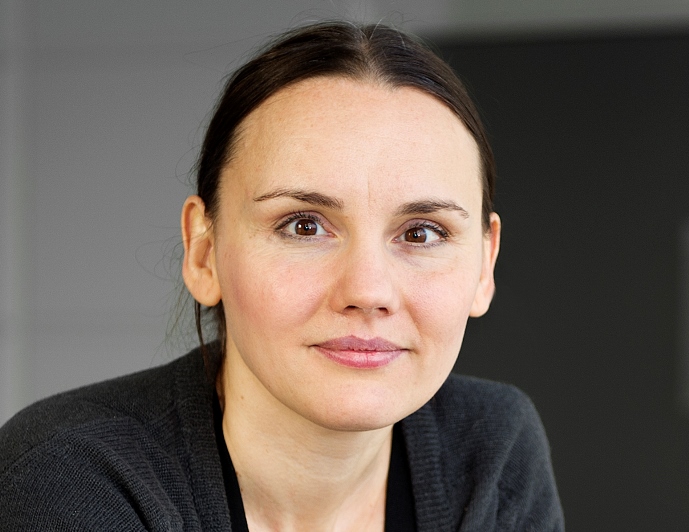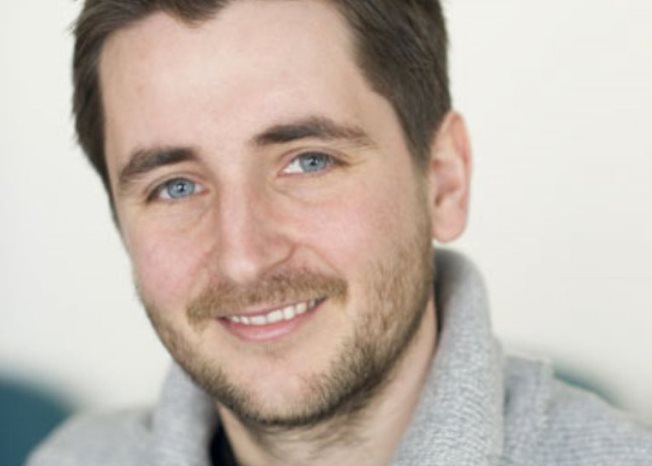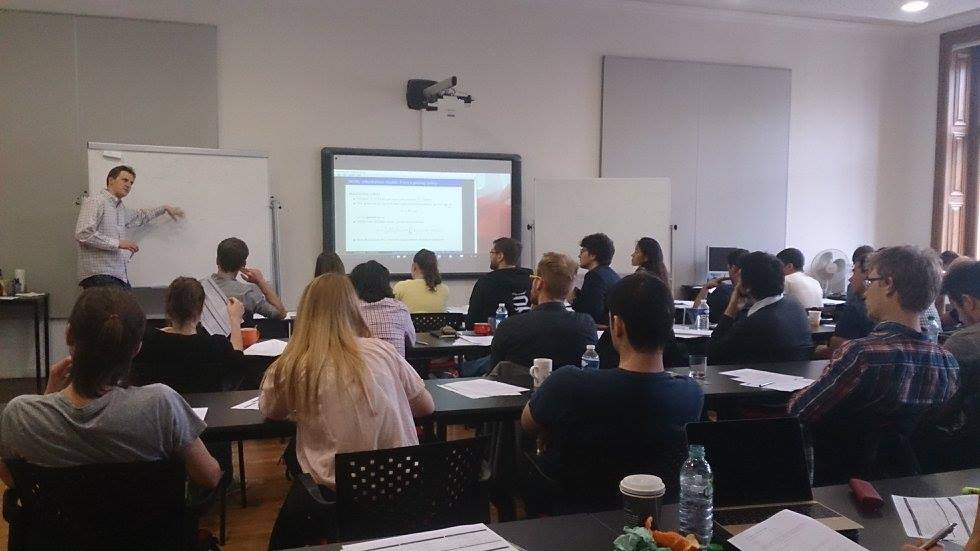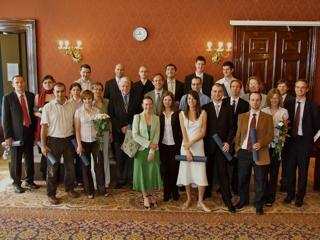Brown bag seminars are an inherent part of CERGE-EI community life. Read a short interview with Jakub Grossmann, current CERGE-EI PhD student, and learn what is the best thing about them. Continue reading BROWN BAG SEMINARS: A GREAT WAY TO SEE WHAT RESEARCH OTHER PEOPLE FROM CERGE-EI ARE DOING
Category Archives: research
THE NOMAD RESEARCHING MIGRATION: AN INTERVIEW WITH NEW FACULTY MEMBER MARIOLA PYTLIKOVÁ
Mariola Pytliková is another new member of the CERGE-EI faculty, joining us as both Assistant Professor and Researcher. In addition to CERGE-EI, she is also active at the VSB Technical University in Ostrava, which is close to the Beskydy mountains, where she currently lives.
FROM HUMBOLDT UNIVERSITY TO THE BANGLADESHI TEXTILE INDUSTRY: AN INTERVIEW WITH NEW CERGE-EI FACULTY MEMBER ANDREAS MENZEL
This year, CERGE-EI welcomed five new faculty members, which ranks among the most important hiring successes in CERGE-EI’s history for faculty expansion. One of them is Andreas Menzel, whose arrival marks an enrichment of the existing circle of CERGE-EI microeconomists.
Not listening? Well, it’s only rational.
Inattention, why we’re all doing it, and why that’s rational – according to economics.
In the lead up to CERGE-EI’s unique conference on Rational Inattention, Associate Professor with Tenure and Researcher, Filip Matejka, provided a free crash course for students to get a rundown on the subject.
Fairly new to the scene and quickly evolving, the field of Rational Inattention in economics is, quite ironically, gaining attention. On Wednesday 24th of May, graduate students from around the globe, including Stanford, NYU, Columbia, UCLA and more, gathered in Prague to learn and discuss the core issues of the subject. Continue reading Not listening? Well, it’s only rational.
People Don’t Just Make Rational Decisions
It seems like there’s no longer a place for economics as we used to know it. A new generation of economists, calling themselves “behavioral economists“, are challenging a basic principle of classic economics: the assumption that humans only make rational decisions. Continue reading People Don’t Just Make Rational Decisions
Did the Patriarch Cause a Baby Boom in Georgia?: Research by CERGE-EI PhD Student Lasha Lanchava
The following post was written by CERGE-EI PhD Student Lasha Lanchava, originally appearing on the ISET Economist blog.
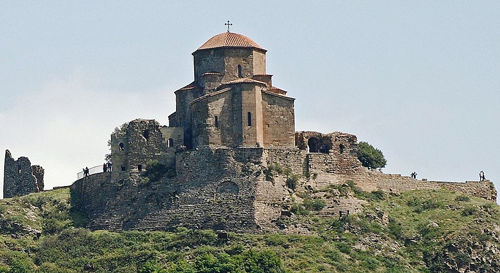
In October 2007, responding to the problem of very low birthrates in the country, Ilia II. of Georgia, the Catholicos-Patriarch of All Georgia, announced that he would personally baptize any third and subsequent child born to Orthodox families from that time onwards. This promise seems to have had a considerable impact on the reproduction behavior of Georgians. According to the National Statistics Office of Georgia (NSOG), the number of births increased from about 49,000 in 2007 to about 57,000 in 2008 and 63,000 in 2009. This is a remarkable 28% increase in two years’ time, while the number of births from 2000 to 2007 had been fluctuating between 46000 and 49000. At the end of 2008, the Patriarch for the first time baptized thousands of babies at the Sameba Cathedral, and the tradition continues until today.
In March 2009, the BBC brought the enthusiastic headline: “Church leader sparks Georgian baby boom”. The article states that “two years after having one of the lowest birth rates in the world, Georgia is enjoying something of a baby boom, following an intervention from the country’s most senior cleric”. The results are, in the words of the Georgian Orthodox Church, “a miracle”. A report with a similar message was published by CNN on April 2010 in which the Patriarch himself claims credit for the surge in births: “I have already baptized about 5,000 children. […] Parents decided to give birth to these children because they had a chance to be the Patriarch’s godchildren.”
The BBC also interviewed the head of Georgia’s civil registry, Giorgi Vashadze. More profanely, he attributed the increased birth rates to accelerated economic growth and increased employment in the years after the Rose Revolution: “Who is now creating families? People who five years ago were out of work,” he said. “Previously, they had no income. They could not get married. Today they are working. They have salaries… So I think this is a major factor.” According to the NSOG, Georgia did indeed experience a remarkable growth in real GDP by about 10 % in 2006 and 2007, going down in 2008 due to war with Russia but still remaining significantly higher than in the previous years.
According to the Caucasus Research Resource Center (CRRC), 94% of the Georgians consider the Patriarch to be the most trustworthy man in the society, and likewise, the church is the most trusted institution in Georgia. Therefore, the opinion of Georgian public can be easily swayed in favor of the church. But is the Patriarch really responsible for the stunning increase of the birth rate in Georgia? Using the toolbox of quantitative economic analysis, I wanted to find out…
A NATURAL EXPERIMENT
Religion as an important driver of socio-economic developments can be traced back to Max Weber’s famous 1905 book The Protestant Ethic and the Spirit of Capitalism, relating the differences in per-capita GDP in Europe to the respective shares of Protestants and Catholics in those countries. Ever since, a huge body of literature has elicited connections between religious beliefs and economic behavior. For example, McCleary and Barro (2003) show that countries with high levels of religious observance (operationalized as attendance at religious services) tend to experience lower GDP growth. Crabtree (2010) explores the link between the share of religious population of a country and its and per-capita incomes. Lipford, McCormick, and Tollison (1993) look at the connection between the rates of church membership and crime and various demographic numbers like divorce, marriage, and fertility.
In our setting, the announcement of the Catholicos-Patriarch’s initiative yields what economists call a “natural experiment”. In the laboratory, it is possible to define a treatment group and a control group, yet many economic questions which are about the society as a whole cannot be answered in the lab. A natural experiment is a situation where for natural reasons there is something like a treatment and something like a control group. In the problem at hand, the majority of Orthodox Christians (OCs), making up 84% of the population, can be considered a treatment group, as they are the only ones to whom the Patriarch’s initiative appeals. The Non-Orthodox Christian (NOC) ethnic minorities, such as Armenians, Azerbaijanis, and other congregations can be considered as a control group, if we assume that the Patriarch’s announcement will not affect their reproduction behavior. The majority of NOC population consists of Armenians and Azerbaijanis who comprise about 15 % share of the total population of Georgia. Armenians are members of the Armenian Apostolic Church and Azerbaijanis are Shiite Muslims. The figure shows the composition of Georgian population by religious belief – the brighter the color, the higher the share of NOC population (except for the occupied territories, which are not included in the analysis).
Using a methodology called difference-in-differences (DID), we can identify whether the religious leader’s initiative had causal impact on the birth rates in Georgia.
Alumni Research on VoxEU.org
 Martin Čihák (PhD, 2002) has had two papers featured on the influential VoxEU.org website, which features cutting-edge research on a variety of European and global economic issues. “Measuring Financial Development” (co-authored with Asli Demirgüç-Kunt, Erik Feyen and, Ross Levine) was published on April 25, 2013 and “Measuring the clarity of central-bank communication” (co-authored with Aleš Bulíř and David-Jan Jansen) appears two weeks prior.
Martin Čihák (PhD, 2002) has had two papers featured on the influential VoxEU.org website, which features cutting-edge research on a variety of European and global economic issues. “Measuring Financial Development” (co-authored with Asli Demirgüç-Kunt, Erik Feyen and, Ross Levine) was published on April 25, 2013 and “Measuring the clarity of central-bank communication” (co-authored with Aleš Bulíř and David-Jan Jansen) appears two weeks prior.
This is the not the first time that CERGE-EI alums have had work published on VoxEU.org. Jakub Matějů (MA, 2011) had an article on VoxEU in 2011, Martin Čihák and fellow alum Tigran Poghosyan (PhD, 2008) had an article on the site in 2010 and Jiří Podpiera (PhD, 2005) and Emil Stavrev (PhD, 2000) have had articles published as well. Previous articles by alumni have run up several thousand views and these most recent two articles by Martin have already exceed 3000 views in a matter of days. Congratulations to all of these alumni on getting their research out to the larger policy-making community!
CERGE-EI Alumni: Barbara Pertold-Gebicka
Barbara got her PhD from CERGE-EI in 2011 and she is currently a postdoctoral fellow at Aarhus University, Denmark. She is married to her former classmate, with whom they met at CERGE-EI.
Why did you decide to study at CERGE-EI? What were your other options?
During my last year of master studies I started working in a consulting company. When designing a pricing strategy for our customer, I have realized that I miss econometric skills. So I looked for post-graduate studies in economics. Originally I was thinking about studying over weekends or attending an intensive summer school, but I changed my mind once I came across the PhD programs offered by CERGE-EI and the Central European University (CEU). I recalled my earlier dreams about a career in academia and applied to both places. CEU put me on a waiting list, but CERGE-EI invited me to the preparatory semester. So I came to Prague…
Going on Mobility, Becoming a Bartender
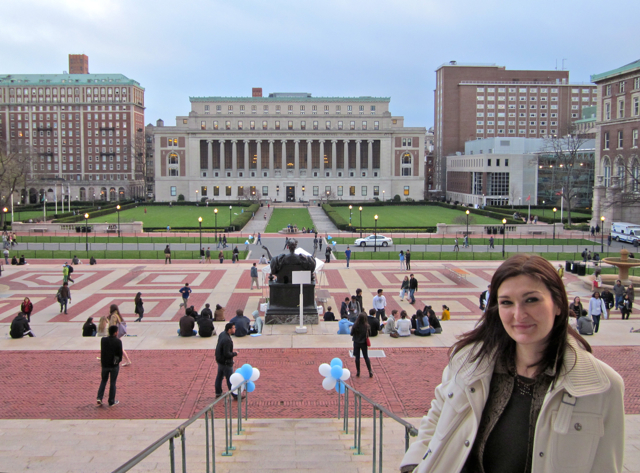 Before sending my previous blog post for editing, I read the final version and realized I had just finished writing a boring piece of text… Columbia this, Columbia that, Ivy league, Nobel prize winners, presidents, big shots and that kind of thing – all that you know from Wiki pages. I finally decided to write something more personal about mobility stay during the Spring semester, 2011 at Columbia University.
Before sending my previous blog post for editing, I read the final version and realized I had just finished writing a boring piece of text… Columbia this, Columbia that, Ivy league, Nobel prize winners, presidents, big shots and that kind of thing – all that you know from Wiki pages. I finally decided to write something more personal about mobility stay during the Spring semester, 2011 at Columbia University.
Continue reading Going on Mobility, Becoming a Bartender
CERGE-EI in Media: Stepan Jurajda on Reforms in the Czech Republic
The following article first appeared on March 28th in the Prague daily newspaper, Lidove Noviny. It was translated from Czech into English by Jan Novotny and edited by Stepan Jurajda.
It Is Better To Not Reform Than Implement a Bad Reform
March 28 2011
Reforms in the Czech Republic are poorly prepared and rarely fully completed and accomplished, said Stepan Jurajda, Director of CERGE-EI, which is devoted to economic research and doctoral studies. According to him, the country lacks an independent expert institution, where reform ideas as well as impacts would be thoroughly analyzed and evaluated.
Continue reading CERGE-EI in Media: Stepan Jurajda on Reforms in the Czech Republic

